SCOTTSDALE, Arizona: Almost immediately after he walked into the Oval Office on his first day as president, Joe Biden began rolling back his predecessor’s immigration policies, which he had assailed throughout the 2020 campaign as harsh and inhumane.
A lot has changed in three years.
Biden, now sounding increasingly like former President Donald Trump, is pressing Congress for asylum restrictions that would have been unthinkable when he took office. He’s doing it under pressure not just from Republicans but from Democrats, including elected officials in cities thousands of miles from the border who are feeling the effects of asylum seekers arriving in the United States in record numbers.
With the 2024 presidential campaign shaping up as a likely rematch between Biden and Trump, immigration has moved to the forefront as one of the president’s biggest potential liabilities. Biden, looking to neutralize it, has already embraced a sweeping bipartisan measure still being negotiated in the Senate that would expand his authority to put strict new limits on border crossings.
“If that bill were the law today, I’d shut down the border right now and fix it quickly,” Biden said last weekend.
The bill’s future is uncertain, and Trump has weighed in against it, but Biden’s Democratic allies have grown impatient for the president to act.
Arizona Gov. Katie Hobbs, a liberal Democrat, recently called on the president to call up the National Guard, and when he declined, she did it herself at the state’s expense.
“Every Arizonan should know we are taking significant and meaningful steps to keep them safe, even when the federal government refuses to,” Hobbs said in her state of the state address in January.
The influx has strained social services in cities including New York, Chicago and Denver, which are struggling to shelter thousands of asylum seekers without housing or work authorization. Images of migrants with nowhere to go camping out in public have dominated local newscasts.
Nine Democratic governors from all across the country sent a letter last week to Biden and congressional leaders pleading for action from Washington “to solve what has become a humanitarian crisis.”
States and cities are spending billions to respond but are outmatched by the record pace of new arrivals, wrote the governors of Arizona, California, Colorado, Illinois, Maryland, Massachusetts, New Jersey, New York and New Mexico.
They asked for money to help with their immediate needs and a commitment to work toward modernizing immigration laws.
“It is clear our national immigration system is outdated and unprepared to respond to this unprecedented global migration,” the governors wrote.
Trump, meanwhile, is eager to rekindle the passions that the border fueled during his successful 2016 campaign, when his vow to build a wall along the southern border with Mexico became perhaps his most familiar rallying cry.
“It has been a message that has resonated not just with Republicans or Democrats, but across the country, because now even those liberal cities, those blue cities, those blue mayors, they’re saying we can’t handle the crisis anymore and give us help,” said Corey Lewandowski, Trump’s first 2016 campaign manager. “It is a fundamental shift in thinking over the last eight years on the issue.”
Trump lamented over the weekend that his border message didn’t resonate when he ran for reelection in 2020. He said it was because he’d done such a good job controlling the border that he “took it out of play,” though at the time voters were largely focused on COVID-19 and the pandemic had dampened job prospects for migrants.
“Literally we couldn’t put it in a speech,” Trump said at a campaign rally Saturday in Las Vegas. “Nobody wanted to hear about the border. We had no border problem. But now we can talk about the border because it’s never, ever been worse than it is now.”
As president, Trump separated children from their families at the US-Mexico border as an effort to deter people from crossing in a policy that was maligned as inhumane by world leaders, US lawmakers and even Pope Francis. When he ran for office the first time he referred to Mexican immigrants as “rapists and criminals” and this campaign has gone farther, saying migrants are ” destroying the blood of our country.”
In the end, total deportations were higher under the first term of President Barack Obama, who enacted enforcement priorities similar to Biden’s, than under Trump. That was due in part to a lack of cooperation from many cities and states whose leaders opposed Trump’s immigration policies.
By the end of Trump’s administration, the US had completed more than 450 miles (720 kilometers) of new wall construction along the 2,000-mile (3,145 kilometer) border. Much of the construction was in areas where there had already been some form of barrier.
An immigration deal in Congress that had been in the works for weeks is now in jeopardy largely because Trump is loath to give Biden a win on immigration, an issue he wants to hammer as his own as he seeks a return to the White House, and his supporters in Congress are following his lead.
White House spokesperson Angelo Fernandez Hernandez said House Republicans under Speaker Mike Johnson are blocking Biden’s efforts to improve border security.
“It’s long past time for Speaker Johnson and the House GOP to join President Biden and work across the aisle in the best interests of the majority of the American people, who back President Biden’s approach,” Fernandez Hernandez said in a statement.
Johnson has argued Biden already has enough authority to stop illegal border crossings, but without congressional backing, many actions he could take would likely be challenged in court. Trump and Biden alike used emergency authority from the COVID-19 pandemic, known as Title 42, to quickly turn back migrants at the border. With the public health emergency now over, Biden can’t use those powers.
Frustration among voters has escalated.
Wayne Bowens, a 72-year-old retired real estate agent in Scottsdale, Arizona, said he’s disgusted by both Biden and Trump’s recent border moves. Biden is only changing his tune because he’s worried about losing, he said, and Trump is hoping to block the Senate deal to help him win.
“Ukraine, Israel. People are dying. And yet other people are thinking, ‘How many votes can I get if I play this right?’” said Bowens, a Republican who dislikes both leading candidates but will likely vote for Trump unless a viable third-party candidate emerges. “It’s become a very disgusting world.”
Immigration remains a major worry for voters in the 2024 election. An AP-NORC poll earlier this month found that those voicing concerns about immigration climbed to 35 percent from 27 percent last year. Most Republicans, 55 percent, say the government needs to focus on immigration in 2024, while 22 percent of Democrats listed immigration as a priority. That’s up from 45 percent and 14 percent, respectively, in December 2022.
Arrests for illegal border crossings from Mexico reached an all-time high in December since monthly numbers have been released.
The Border Patrol tallied just under 250,000 arrests on the Mexican border in December, up 31 percent from 191,000 in November and up 13 percent from 222,000 in December 2022, the previous all-time high.
The situation on the border makes Biden vulnerable with two voting groups he’ll need to win — Latinos and college-educated white Republican women, said Mike Madrid, a California-based Republican strategist who has worked to defeat Trump and has a book on Latino voters set for release this summer.
Biden has no choice but to embrace tougher border security and restrict asylum, even though it will anger progressives in his base, Madrid said.
“It is his single biggest problem,” Madrid said. “And it is the single biggest opportunity, because I think if he can put the Republicans on defense he’s in a very commanding position to win reelection.”



























